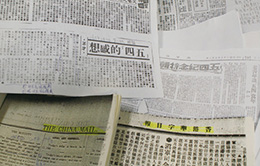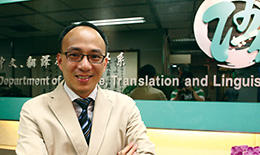
Chinese Mail, The China Mail and The
Colonial Office Series: Important first-hand documents in investigating the history
of Hong Kong and studying the cultural, societal and political developments of the city.
The topic 'Historical Frontiers' was inspired after
reading RGC's Newsletter Research Frontiers two years ago. To my
understanding, new frontiers refer to research areas which
possess features of valuable 'discovery' and 'innovative'
findings. The project's subtopic is A Study of the May
Fourth Spiritual Interpretation and Development in the
Context of Hong Kong. To me this is an area worth exploring
and of high innovative value. For several decades, the
May Fourth Movement has been a significant topic for
researchers of modern Chinese history, intellectual history, as well as modern
and contemporary Chinese literature. However, most of
these studies have mainly focused on the perspective
in a broader sense, i.e. at a national level even studies of
the regional and local impact of the May Fourth Movement
have always been limited to several major cities i.e. Beijing,
Shanghai on the mainland.
From the perspective of this particular research, it
is strongly believed that the impact of the May
Fourth Movement should be analyzed from the local
perspectives of other cities and regions i.e. Hong
Kong and Guangdong, which in academic studies have
traditionally been neglected. The real impact of the
May Fourth Movement has rarely been scrutinized into
these particular places. This is the reason why it
is important to look into the actual regional and
local impact of the May Fourth Movement. At present,
it is found that only a handful of people have
addressed the relationship between Hong Kong and the
May Fourth Movement. Furthermore, the various
records and recollections have never been analyzed
together in their entirety to provide a complete and
objective picture of the event. By collecting
first-hand documents, such as newspaper articles of
the time; Colonial Office Series; documents of
public organizations; and the diaries and
recollection of certain scholars, it is hoped that a
clearer picture can be drawn on how the May Fourth
Movement has been interpreted and developed in Hong
Kong. This would help obtain a multi-level
understanding of the historical meaning of the May
Fourth Movement on the development of modern and
contemporary Chinese history, and how different
interpretations have been developed in Hong Kong.
Moreover, the cultural development of Hong Kong can
be analyzed by understanding how China interacted
with Hong Kong in the area of politics, academics
and culture during this period.
|
|
 Dr Hok-Yin CHAN
Dr Hok-Yin CHAN
In conclusion, from the perspective of studies
on the May Fourth Movement, probing into the development and interpretations of a 'fringe'
region such as Hong Kong rather than that of major cities like Beijing and Shanghai will provide
a more objective picture of its impact, meaning and historical value on the development of
modern China. From the perspective of Hong Kong historical studies, this project will provide an
alternative way of looking into the development of Hong Kong's culture and society, political
environment, and academic community. This is critical in order to understand the ideological
source behind the influences of Hong Kong's intellectual movement and local literature.
Part of the findings of this project have been
published in a paper entitled 'The May Fourth
Movement in Hong Kong 1919' in Asian Culture (Volume 35, July 2011) published by the
Singapore Society of Asian Studies and it will be reprinted in a book entitled Hong Kong: City
Imagination and Culture Memories co-edited by Professor Chen
Pingyuan (Peking University and The Chinese University of Hong Kong), Professor
Chan Kwok Kou (The Hong Kong Institute of Education) and Professor David Der-Wei
Wang (Harvard University). The book will be published by
Peking University Press later this year.
Dr Hok-Yin CHAN
Department of Chinese,
Translation and Linguistics
City University of Hong Kong
hokychan@cityu.edu.hk
|
